Bachelor's Degree in Logistics Engineering and Industrial Organization

Cutting-edge training in flow management and industrial organization: Your gateway to the business world
The Bachelor's Degree in Logistics and Industrial Organization stands out as an innovative program in Spain, aligning closely with trends observed in prestigious international technological centers. This new degree equips students with the skills necessary to forge successful careers in one of the most contemporary and socially impactful fields, offering practical content that is highly relevant in today's society.
In addition to imparting essential technical competences, our program emphasizes hands-on practical training facilitated by industry experts. These professionals bring their knowledge and leadership acumen to the classroom, facilitating the launch of students' professional careers. Moreover, ethical values and sustainability are core concerns woven throughout the curriculum, reflecting our commitment to responsible business practices.
Why study the Grado en Ingeniería Logística y Organización Industrial

Distinctive Curriculum
Highly practical content designed for quality education with professors actively involved in the industry, fostering direct connections with the sector via the Bachelor's Degree Advisory Council. Real-world projects further enhance the learning experience.

Partnering with leading companies
DHL Express, Robert Bosch, CLH, Ferrovial, and Santander are among the companies and institutions offering professional internships to students. Their involvement in the curriculum ensures validation of the educational process, facilitated by expert professors.

International Education
Students have the opportunity to pursue part of their studies at internationally renowned universities in the sector, such as the University of Technology Sydney (Australia), San Diego State University (USA), or Hochschule München (Germany).

Final Project in a Professional Setting
Thanks to our internship agreements with some of the leading companies in the sector, students have the opportunity to complete their Final Research Project in a professional work environment or within the framework of our research groups.
Experience something extraordinary at the Higher Polytechnic School
If you are looking to embark on a once-in-a-lifetime endeavor, it begins at university.
If your goal is to make a transformative impact on the world, start with Nebrija's unparalleled education.
Curriculum
All our degrees and curricula have been meticulously developed in compliance with the latest legislative guidelines and have undergone verification by the National Quality Assessment Agency.
Each student is required to complete a total of 240 credits
First year 60 ECTS
First Semester 30 ECTS- 6 ECTS | Mathematics I
- 6 ECTS | Calculus I
- 6 ECTS | Physics I
- 6 ECTS | Graphic Expression I
- 6 ECTS | Chemistry
Second Semester 30 ECTS- 6 ECTS | Mathematics II
- 6 ECTS | Calculus II
- 6 ECTS | Physics II
- 6 ECTS | Graphic Expression II
- 6 ECTS | Business Organization
Second year 60 ECTS
First Semester 30 ECTS- 6 ECTS | Fundamentals of Computer Science
- 6 ECTS | Statistics
- 6 ECTS | Automatic Regulation
- 6 ECTS | Financial and Analytical Accounting
- 6 ECTS | Modes of Transportation
Second Semester 30 ECTS- 6 ECTS | Demand and Inventory Planning
- 6 ECTS | Quantitative Methods of Industrial Organization
- 6 ECTS | IT and Communications
- 6 ECTS | Thermodynamics
- 6 ECTS | Mechanics and Strength of Materials
Third year 60 ECTS
First Semester 30 ECTS- 6 ECTS | Logistics Center Operations
- 6 ECTS | Project Management
- 6 ECTS | International Trade and Logistics
- 6 ECTS | Business Information Systems
- 6 ECTS | Operations Management I
Second Semester 30 ECTS- 6 ECTS | Distribution Logistics Operations
- 6 ECTS | Supply Chain Planning
- 6 ECTS | Business Management
- 6 ECTS | Industrial Quality and Maintenance
- 6 ECTS | Purchasing and Logistics Contracts
Fourth year 60 ECTS
First Semester 30 ECTS- 6 ECTS | Smart Mobility and Logistics
- 6 ECTS | Design of Logistics and Transportation Networks
- 6 ECTS | Sustainability
- 6 ECTS | Investment and Financing Decisions
- 6 ECTS | Operations Management II
Second Semester 36 ECTS- 6 ECTS | Lead
- 6 ECTS | English
- 6 ECTS | Professional Internship
- 12 ECTS | Final Research Project
More info about the subjects
The recognition of 6 credits will be assessed depending on the different activities that the student performs throughout his degree. They will be awarded for university cultural activities, sports, student representation, solidarity and cooperation, or for taking one of the following subjects: Ethics of volunteering or Human Rights.
Program which aims to promote the practical training of students, under the continuous supervision of the Department of Professional Careers of the University, the academic department corresponding to the degree and the company or collaborating institution where the practices are carried out. Advice is provided on the internship and there is follow-up and tutoring, always taking into account the professional orientation of each student.
More Information about Internships in CompaniesThe End of Degree Project is an academic report that delves into a subject of the curriculum and allows the evaluation of the skills acquired in the Degree. It can be linked to the professional internship or it can also be part of a research project.
Nebrija University, which is committed to languages and quality, provides the student with added value with the Diploma in English Professional Communication, which will allow him/her to achieve with confidence the competence demanded to successfully join the labor market.
It corresponds to level C1.
More information hereSpecialization Diplomas from the Higher Polytechnic School
Our program offers the unique opportunity to integrate Specialization Diplomas, enabling students to enhance their education and increase their prospects with leading companies, both nationally and internationally, within their respective sectors.
We deliver our courses in a flexible hybrid format, blending face-to-face and online instruction. This approach allows students to conveniently balance their coursework with their studies.
Professors
| Profesores Professors | Porcentaje de Doctores Percentage of PhD holders |
| 17 | 53% |
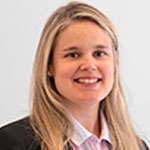 Aránzazu Garitagoitia Cid
Directora del Grado en Ingeniería Logística y Organización Industrial
Director of the Bachelor's Degree in Logistics Engineering and Industrial Organization
Doctora en Física de Materiales y Microscopía Electrónica por la Universidad Técnica de Dresde (Alemania). Licenciada en Ciencias Químicas por la Universidad Complutense de Madrid y . Intensa trayectoria en investigación, industria alemana y docencia, desarrollada principalmente en Dresde (Alemania). Ha realizado numerosas actividades como docente e investigadora en el ámbito industrial en Alemania. Ha sido profesora en el seminario "Nanoanalytik", organizado por la Deutsche Gesellschaft für Materialkünde (DGM), asociación alemana de Ciencias de Materiales, además de en el curso de Máster "Characterization of blends for Organic Photovoltaic (OPV) cells using Low Voltage Scanning Electron Microscopy (LVSEM)". Fue investigadora asistente de 2013 a 2017 en el proyecto industrial "Estudio de las características y aplicaciones del detector EsB" en colaboración con el fabricante de microscopios electrónicos y lentes Carl Zeiss GmbH. Dos de sus publicaciones más remarcables son: A. Garitagoitia Cid, R. Rosenkranz, M. Löffler, A. Clausner, Y. Standke, E. Zschech, Ultramicroscopy, 2018, 195, 47-52. A. Garitagoitia Cid, E. Moayedi, R. Rosenkranz, A. Clausner, K. Pakbaz, E. Zschech, IEEE Transactions on Device and Materials Reliability, 2016, Vol. 16, Nº 4, 461-464.
Aránzazu Garitagoitia Cid
Directora del Grado en Ingeniería Logística y Organización Industrial
Director of the Bachelor's Degree in Logistics Engineering and Industrial Organization
Doctora en Física de Materiales y Microscopía Electrónica por la Universidad Técnica de Dresde (Alemania). Licenciada en Ciencias Químicas por la Universidad Complutense de Madrid y . Intensa trayectoria en investigación, industria alemana y docencia, desarrollada principalmente en Dresde (Alemania). Ha realizado numerosas actividades como docente e investigadora en el ámbito industrial en Alemania. Ha sido profesora en el seminario "Nanoanalytik", organizado por la Deutsche Gesellschaft für Materialkünde (DGM), asociación alemana de Ciencias de Materiales, además de en el curso de Máster "Characterization of blends for Organic Photovoltaic (OPV) cells using Low Voltage Scanning Electron Microscopy (LVSEM)". Fue investigadora asistente de 2013 a 2017 en el proyecto industrial "Estudio de las características y aplicaciones del detector EsB" en colaboración con el fabricante de microscopios electrónicos y lentes Carl Zeiss GmbH. Dos de sus publicaciones más remarcables son: A. Garitagoitia Cid, R. Rosenkranz, M. Löffler, A. Clausner, Y. Standke, E. Zschech, Ultramicroscopy, 2018, 195, 47-52. A. Garitagoitia Cid, E. Moayedi, R. Rosenkranz, A. Clausner, K. Pakbaz, E. Zschech, IEEE Transactions on Device and Materials Reliability, 2016, Vol. 16, Nº 4, 461-464.
 Adrián Altamira Peña
Profesor del área de Expresión gráfica
Professor of the area of graphic expression
Graduado en Ingeniería Mecánica e Ingeniería en Diseño Industrial y Desarrollo de Productos por la Universitat Politècnica de València. Máster en Ingeniería de Vehículos de Competición por la Universidad Nebrija. Máster en Ciencia e Ingeniería de Materiales por la Universidad Carlos III. Doctorando en el programa de Ingeniería Mecánica y Organización Industrial en la Universidad Carlos III.
Profesor del área de Expresión Gráfica desde el curso 22-23 en la Universidad Nebrija.
Experiencia como ingeniero en el sector automotriz desde 2022 en la Universidad Nebrija. Especialmente en el desarrollo de carrocerías de materiales compuestos para vehículos de altas prestaciones, como el proyecto Nebrija to Dakar, entre otros.
Adrián Altamira Peña
Profesor del área de Expresión gráfica
Professor of the area of graphic expression
Graduado en Ingeniería Mecánica e Ingeniería en Diseño Industrial y Desarrollo de Productos por la Universitat Politècnica de València. Máster en Ingeniería de Vehículos de Competición por la Universidad Nebrija. Máster en Ciencia e Ingeniería de Materiales por la Universidad Carlos III. Doctorando en el programa de Ingeniería Mecánica y Organización Industrial en la Universidad Carlos III.
Profesor del área de Expresión Gráfica desde el curso 22-23 en la Universidad Nebrija.
Experiencia como ingeniero en el sector automotriz desde 2022 en la Universidad Nebrija. Especialmente en el desarrollo de carrocerías de materiales compuestos para vehículos de altas prestaciones, como el proyecto Nebrija to Dakar, entre otros.
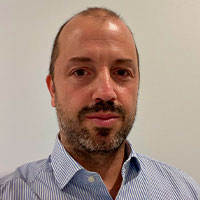 Juan Delibes Espinosa
Profesor del área de Logística y cadena de suministro
Professor of Logistics and Supply Chain
Juan Delibes Espinosa
Profesor del área de Logística y cadena de suministro
Professor of Logistics and Supply Chain
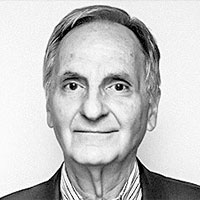 Carlos Augusto di Prisco de Venanzi
Profesor del área de Matemáticas Aplicadas
Professor of Applied Mathematics
Licenciado en Matemáticas (Universidad Central de Venezuela), PhD. Matemáticas (Massachusetts Institute of Technology, USA, 1976). Segundo Vicepresidente de la Academia de Ciencias Físicas, Matemáticas y Naturales (2009-2011). Investigador del Departamento de Matemáticas del Instituto Venezolano de Investigaciones Científicas (IVIC) desde 1976. Investigador Emérito del IVIC (2007). Decano del Centro de Estudios Avanzados del IVIC 1989-1991. Docente del Departamento de Matemáticas de la Facultad de Ciencias de la Universidad Central de Venezuela desde 1976. Profesor Titular desde 1985, Jubilado desde 2003. Con su trabajo sobre diversos aspectos de la teoría de conjuntos y los fundamentos matemáticos sobre varios temas de la teoría combinatoria de conjuntos, ha publicado varios libros de texto, y artículos científicos en revistas de prestigio, como Advances in Mathematics, Journal of Symbolic Logic, Mathematical Logic Quarterly, Fundamenta Mathematicae, Proceedings of the American Mathematical Society. Ha hecho contribuciones al estudio de estructuras combinatorias relacionadas con propiedades de grandes cardinales y de propiedades combinatorias de conjuntos de números naturales y conjuntos de números reales, y sobre formas débiles del axioma de elección. Sus resultados más recientes tratan problemas relacionados con la Teoría de Ramsey. Ha dirigido más de 40 tesis de pre y postgrado. Recipiente del premio «Lorenzo Mendoza Fleury» de la Fundación Polar, 1983. Miembro del Centro de Lógica de la Universidad de Campinas, Brasil, desde 1988. Profesor invitado en Smith College (Massachusetts, 1985-1986); del Research Associate University of California, Berkeley (1992-1993); y del Centre de Recerca Matematica, Bellaterra, España, (1997-1998). Catedrático Visitante de la Universidad de Evora, Portugal, (2000); y de la Universidad de Paris VII, (2000 y 2006). Investigador Visitante del Institut Catalan de Recerca i Estudis Avançats (2002-2005); Profesor Visitante Lluis Santaló, Centre de Recerca Matemática, Barcelona. (2010); de la Universidad de Los Andes, Bogotá, Colombia (2012-2014). Fellow, del John Simon Guggenheim Memorial Foundation, (1991-1992); y de la Third World Academy of Sciences (desde 1999). Miembro Academia de Ciencias de América Latina (desde 2016).
Carlos Augusto di Prisco de Venanzi
Profesor del área de Matemáticas Aplicadas
Professor of Applied Mathematics
Licenciado en Matemáticas (Universidad Central de Venezuela), PhD. Matemáticas (Massachusetts Institute of Technology, USA, 1976). Segundo Vicepresidente de la Academia de Ciencias Físicas, Matemáticas y Naturales (2009-2011). Investigador del Departamento de Matemáticas del Instituto Venezolano de Investigaciones Científicas (IVIC) desde 1976. Investigador Emérito del IVIC (2007). Decano del Centro de Estudios Avanzados del IVIC 1989-1991. Docente del Departamento de Matemáticas de la Facultad de Ciencias de la Universidad Central de Venezuela desde 1976. Profesor Titular desde 1985, Jubilado desde 2003. Con su trabajo sobre diversos aspectos de la teoría de conjuntos y los fundamentos matemáticos sobre varios temas de la teoría combinatoria de conjuntos, ha publicado varios libros de texto, y artículos científicos en revistas de prestigio, como Advances in Mathematics, Journal of Symbolic Logic, Mathematical Logic Quarterly, Fundamenta Mathematicae, Proceedings of the American Mathematical Society. Ha hecho contribuciones al estudio de estructuras combinatorias relacionadas con propiedades de grandes cardinales y de propiedades combinatorias de conjuntos de números naturales y conjuntos de números reales, y sobre formas débiles del axioma de elección. Sus resultados más recientes tratan problemas relacionados con la Teoría de Ramsey. Ha dirigido más de 40 tesis de pre y postgrado. Recipiente del premio «Lorenzo Mendoza Fleury» de la Fundación Polar, 1983. Miembro del Centro de Lógica de la Universidad de Campinas, Brasil, desde 1988. Profesor invitado en Smith College (Massachusetts, 1985-1986); del Research Associate University of California, Berkeley (1992-1993); y del Centre de Recerca Matematica, Bellaterra, España, (1997-1998). Catedrático Visitante de la Universidad de Evora, Portugal, (2000); y de la Universidad de Paris VII, (2000 y 2006). Investigador Visitante del Institut Catalan de Recerca i Estudis Avançats (2002-2005); Profesor Visitante Lluis Santaló, Centre de Recerca Matemática, Barcelona. (2010); de la Universidad de Los Andes, Bogotá, Colombia (2012-2014). Fellow, del John Simon Guggenheim Memorial Foundation, (1991-1992); y de la Third World Academy of Sciences (desde 1999). Miembro Academia de Ciencias de América Latina (desde 2016).
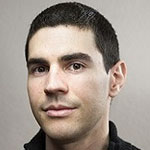 Omar Díaz Luque
Profesor del área de Fundamentos de la Física
Professor of the area of Fundamentals of Physics
Doctor en Tecnologías Industriales e Informáticas por la Universidad Antonio de Nebrija. Graduado en Ciencias Físicas por la Universidad Complutense de Madrid, en la especialidad de Física Aplicada. Máster en Nanofísica y Materiales Avanzados por dicha universidad. Ha realizado diversas colaboraciones en actividades y proyectos científicos con la Universidad Complutense, el Instituto de Magnetismo Aplicado y la Universidad Antonio de Nebrija. Profesor asociado en la Escuela Politécnica Superior de la Universidad Nebrija.
Omar Díaz Luque
Profesor del área de Fundamentos de la Física
Professor of the area of Fundamentals of Physics
Doctor en Tecnologías Industriales e Informáticas por la Universidad Antonio de Nebrija. Graduado en Ciencias Físicas por la Universidad Complutense de Madrid, en la especialidad de Física Aplicada. Máster en Nanofísica y Materiales Avanzados por dicha universidad. Ha realizado diversas colaboraciones en actividades y proyectos científicos con la Universidad Complutense, el Instituto de Magnetismo Aplicado y la Universidad Antonio de Nebrija. Profesor asociado en la Escuela Politécnica Superior de la Universidad Nebrija.
 Javier Freijo Martín
Profesor del área de Química
Professor of Chemistry
Doctor en Farmacia por la Universidad de Navarra y Master en Investigación y Desarrollo de Medicamentos. Miembro de la Sociedad Española de Química Terapéutica ha desarrollado proyectos de investigación en el diseño y síntesis de nuevas moléculas con actividad terapéutica. Desde el año 1999 ha centrado su actividad en la docencia universitaria.
Javier Freijo Martín
Profesor del área de Química
Professor of Chemistry
Doctor en Farmacia por la Universidad de Navarra y Master en Investigación y Desarrollo de Medicamentos. Miembro de la Sociedad Española de Química Terapéutica ha desarrollado proyectos de investigación en el diseño y síntesis de nuevas moléculas con actividad terapéutica. Desde el año 1999 ha centrado su actividad en la docencia universitaria.
 Susana García García-Tuñón
Profesora del área de Empresa
Professor of Business Area
Licenciada en CC. Económicas y Empresariales por la Universidad Complutense de Madrid. Rama economía de la empresa. Master en IoT (Internet de las Cosas), Inteligencia Artificial, Realidad Virtual y Aumentada y Robótica en The Valley Business & Tech School en 2016. Formación en IA Generativa y Large Language Models (LLMs, Transformers, RNNs, ChatGPT) y Phyton. Docente en Máster de Negocios Digitales (Universidad Europea de Madrid), impartiendo la asignatura de Ecosistema Digital (Inteligencia Artificial, Robótica, VR, AR, Innovación, organizaciones exponenciales…). Docente en EAE Business School (Planeta Formación) en Máster de Ecommerce y Marketing Online, Dirección de Marketing. Desde 2017 hasta hoy. Ediciones Inglés y español. Docente MIB (Master Internet Business) en ISDI. Docente en Next International Business en Master como Dirección Corporativa, Marketing Digital, Business Intelligence, Inteligencia Artificial, Creación y Aceleración Empresarial. Docente de Seminarios de Inteligencia Artificial para el Ejército de Tierra (a través de Criteria Formación). Profesora asociada de la Escuela Politécnica Superior de la Universidad Nebrija.
Susana García García-Tuñón
Profesora del área de Empresa
Professor of Business Area
Licenciada en CC. Económicas y Empresariales por la Universidad Complutense de Madrid. Rama economía de la empresa. Master en IoT (Internet de las Cosas), Inteligencia Artificial, Realidad Virtual y Aumentada y Robótica en The Valley Business & Tech School en 2016. Formación en IA Generativa y Large Language Models (LLMs, Transformers, RNNs, ChatGPT) y Phyton. Docente en Máster de Negocios Digitales (Universidad Europea de Madrid), impartiendo la asignatura de Ecosistema Digital (Inteligencia Artificial, Robótica, VR, AR, Innovación, organizaciones exponenciales…). Docente en EAE Business School (Planeta Formación) en Máster de Ecommerce y Marketing Online, Dirección de Marketing. Desde 2017 hasta hoy. Ediciones Inglés y español. Docente MIB (Master Internet Business) en ISDI. Docente en Next International Business en Master como Dirección Corporativa, Marketing Digital, Business Intelligence, Inteligencia Artificial, Creación y Aceleración Empresarial. Docente de Seminarios de Inteligencia Artificial para el Ejército de Tierra (a través de Criteria Formación). Profesora asociada de la Escuela Politécnica Superior de la Universidad Nebrija.
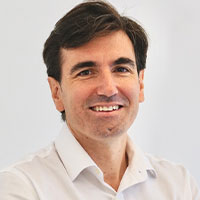 Jorge González de la Fuente
Director del Grado en Ingeniería en Tecnologías Industriales
Jorge González de la Fuente
Director del Grado en Ingeniería en Tecnologías Industriales Profesor del área de Ingeniería Eléctrica y Electrónica Director of the Degree in Industrial Technology Engineering
Professor of Electrical and Electronic Engineering Ingeniero Industrial Superior por la Universidad de Valladolid, certificado en Project Management por el Project Management Institute, Coach profesional por ASESCO, Mentor profesional con más de 5 años de experiencia con jóvenes universitarios en sus procesos de incorporación al mercado laboral, emprendedor y fundador de NextPlay, empresa del sector educativo con una solución que permite que los jóvenes alumnos reciban una orientación formativo-laboral adecuada a sus necesidades, con casi 20 años de experiencia internacional en puestos de responsabilidad como Consultor, Project Manager, Key Account Manager y Director Comercial en los sectores de Automoción, Logística, Alimentación y Metalurgia
 Jesús Carlos Guzmán Mínguez
Profesor del área de Química
Professor of Chemistry
Doctor en Física de los Materiales por la Universidad Autónoma de Madrid (UAM) y Licenciado en Ciencias Químicas por la Universidad Complutense de Madrid (UCM). Máster en Ciencia y Tecnología de Nuevos Materiales (CyTNM) por la Universidad de Sevilla (US). El doctorado fue realizado en el Instituto de Cerámica y Vidrio que pertenece al CSIC. Acreditado para las figuras docentes de Profesor Contratado Doctor y Profesor de Universidad Privada por la ANECA. Experto en el procesamiento de cerámicas funcionales con propiedades magnéticas obtenidas por métodos sostenibles como la síntesis de combustión a baja temperatura, así como el diseño de nuevos imanes permanentes que son potencialmente útiles para la sustitución de imanes basados en Tierras Raras. Miembro de la Sociedad Española de Cerámica y Vidrio desde 2017. Primer premio a la mejor ponencia en el Congreso de Jóvenes Investigadores del ICV-CSIC (2017). Investigador en el Grupo de Materiales y Fabricación Aditiva (MOD3RN) y profesor en la Escuela Politécnica Superior de la Universidad Nebrija.
Jesús Carlos Guzmán Mínguez
Profesor del área de Química
Professor of Chemistry
Doctor en Física de los Materiales por la Universidad Autónoma de Madrid (UAM) y Licenciado en Ciencias Químicas por la Universidad Complutense de Madrid (UCM). Máster en Ciencia y Tecnología de Nuevos Materiales (CyTNM) por la Universidad de Sevilla (US). El doctorado fue realizado en el Instituto de Cerámica y Vidrio que pertenece al CSIC. Acreditado para las figuras docentes de Profesor Contratado Doctor y Profesor de Universidad Privada por la ANECA. Experto en el procesamiento de cerámicas funcionales con propiedades magnéticas obtenidas por métodos sostenibles como la síntesis de combustión a baja temperatura, así como el diseño de nuevos imanes permanentes que son potencialmente útiles para la sustitución de imanes basados en Tierras Raras. Miembro de la Sociedad Española de Cerámica y Vidrio desde 2017. Primer premio a la mejor ponencia en el Congreso de Jóvenes Investigadores del ICV-CSIC (2017). Investigador en el Grupo de Materiales y Fabricación Aditiva (MOD3RN) y profesor en la Escuela Politécnica Superior de la Universidad Nebrija.
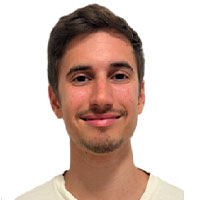 Álvaro Hernández Herrera
Profesor del área de Estadística
Professor of Statistics
Graduado en Matemáticas por la Universidad Autónoma de Madrid. Máster en Matemáticas y Aplicaciones con la especialidad de investigación en la Universidad Autónoma de Madrid. Actualmente centrado en el estudio de L-valores especiales de módulos de Drinfeld, una reciente línea de investigación dentro de la Teoría de números.
Álvaro Hernández Herrera
Profesor del área de Estadística
Professor of Statistics
Graduado en Matemáticas por la Universidad Autónoma de Madrid. Máster en Matemáticas y Aplicaciones con la especialidad de investigación en la Universidad Autónoma de Madrid. Actualmente centrado en el estudio de L-valores especiales de módulos de Drinfeld, una reciente línea de investigación dentro de la Teoría de números.
 Ingo Kaiser
Profesor del área de Fundamentos de la Física
Professor of the area of Fundamentals of Physics
Doctor Ingeniero por la Facultad de Ingeniería Mecánica de la Universidad Hannover (Alemania). Colaborador científico e investigador asistente en la Universidad de Hannover (Alemania) y en el Centro Aeroespacial Alemán (DLR) Oberpfaffenhofen (Alemania, cerca de Munich). Además, era vice-director del DLR_School_Lab (Laboratorio de Escuela) Oberpfaffenhofen. Su investigación está focalizada en la simulación computacional de vehículos ferroviarios. Sus estudios se centran en la modelización de ejes montados y carriles como cuerpos flexibles y en la modelización detallada del contacto rueda - carril. Su investigación científica incluye sistemas multicuerpos, elementos finitos y métodos numéricos. Más de once publicaciones en revistas científicas JCR. Revisor de artículos científicos para varias revistas científicas (Vehicle System Dynamics, Multibody System Dynamics, Wear, etc.). Un sexenio de investigación reconocido. En 2004 recibió el IUTAM Bureau Prize (premio de la oficina de la International Union of Theoretical and Applied Mechanics para investigadores jóvenes) por su trabajo “The running behaviour of an elastic wheelset” presentado en el ICTAM 2004 (International Congress of Theoretical and Applied Mechanics) en Warszawa (Polonia). Presentó su trabajo científico también en los congresos de IAVSD (International Association for Vehicle System Dynamics) en 2005 en Milano (Italia), en 2011 en Manchester (Reino Unido) y 2015 en Graz (Austria) y en las conferencias internacionales de tecnología ferroviaria (International Conference on Railway Technology) en 2012 en Las Palmas de Gran Canaria, en 2016 en Cagliari (Italia) y en 2018 en Sitges. Ponente invitado en la International Conference on Railway Technology en 2018. Comenzó su actividad docente en el año 2012 como docente colaborador habitual en la Rolling Stock Summer School, celebrada en Kraków (Polonia) en 2012 y 2014, y en Lecco (Italia, cerca de Milano) en 2016, donde presentó sus estudios sobre la modelización del contacto rueda - carril y el uso del programa multicuerpo profesional Simpack. Es profesor de la Universidad Nebrija desde el año 2018.
Ingo Kaiser
Profesor del área de Fundamentos de la Física
Professor of the area of Fundamentals of Physics
Doctor Ingeniero por la Facultad de Ingeniería Mecánica de la Universidad Hannover (Alemania). Colaborador científico e investigador asistente en la Universidad de Hannover (Alemania) y en el Centro Aeroespacial Alemán (DLR) Oberpfaffenhofen (Alemania, cerca de Munich). Además, era vice-director del DLR_School_Lab (Laboratorio de Escuela) Oberpfaffenhofen. Su investigación está focalizada en la simulación computacional de vehículos ferroviarios. Sus estudios se centran en la modelización de ejes montados y carriles como cuerpos flexibles y en la modelización detallada del contacto rueda - carril. Su investigación científica incluye sistemas multicuerpos, elementos finitos y métodos numéricos. Más de once publicaciones en revistas científicas JCR. Revisor de artículos científicos para varias revistas científicas (Vehicle System Dynamics, Multibody System Dynamics, Wear, etc.). Un sexenio de investigación reconocido. En 2004 recibió el IUTAM Bureau Prize (premio de la oficina de la International Union of Theoretical and Applied Mechanics para investigadores jóvenes) por su trabajo “The running behaviour of an elastic wheelset” presentado en el ICTAM 2004 (International Congress of Theoretical and Applied Mechanics) en Warszawa (Polonia). Presentó su trabajo científico también en los congresos de IAVSD (International Association for Vehicle System Dynamics) en 2005 en Milano (Italia), en 2011 en Manchester (Reino Unido) y 2015 en Graz (Austria) y en las conferencias internacionales de tecnología ferroviaria (International Conference on Railway Technology) en 2012 en Las Palmas de Gran Canaria, en 2016 en Cagliari (Italia) y en 2018 en Sitges. Ponente invitado en la International Conference on Railway Technology en 2018. Comenzó su actividad docente en el año 2012 como docente colaborador habitual en la Rolling Stock Summer School, celebrada en Kraków (Polonia) en 2012 y 2014, y en Lecco (Italia, cerca de Milano) en 2016, donde presentó sus estudios sobre la modelización del contacto rueda - carril y el uso del programa multicuerpo profesional Simpack. Es profesor de la Universidad Nebrija desde el año 2018.
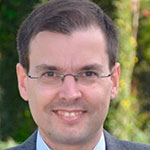 Íñigo López Ansorena
Profesor del área de Organización Industrial
Professor of Industrial Organization
Ingeniero de caminos, canales y puertos, con la especialidad de transportes, por la Universidad Politécnica de Madrid. Doctor en sistemas de ingeniería civil por la Universidad Politécnica de Madrid. Master en logística, transporte y seguridad vial por la UNED. Master en big data y business intelligence y MBA por la Universidad Isabel I. Autor de más de 20 artículos publicados en revistas internacionales indexadas en Journal Citation Reports o SCImago (scopus). Ponente en congresos nacionales e internaciones como el Congreso de Ingeniería del Transporte (CIT), la Maritime Transport Conference, o la International Association of Maritime Economists Conference (IAME). También con experiencia en la empresa privada, en los últimos años ha centrado sus investigaciones en campos diversos como las redes marítimas o el machine learning.
Íñigo López Ansorena
Profesor del área de Organización Industrial
Professor of Industrial Organization
Ingeniero de caminos, canales y puertos, con la especialidad de transportes, por la Universidad Politécnica de Madrid. Doctor en sistemas de ingeniería civil por la Universidad Politécnica de Madrid. Master en logística, transporte y seguridad vial por la UNED. Master en big data y business intelligence y MBA por la Universidad Isabel I. Autor de más de 20 artículos publicados en revistas internacionales indexadas en Journal Citation Reports o SCImago (scopus). Ponente en congresos nacionales e internaciones como el Congreso de Ingeniería del Transporte (CIT), la Maritime Transport Conference, o la International Association of Maritime Economists Conference (IAME). También con experiencia en la empresa privada, en los últimos años ha centrado sus investigaciones en campos diversos como las redes marítimas o el machine learning.
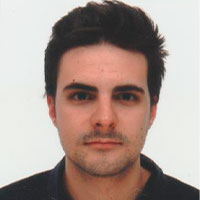 Jorge Martín Beato
Profesor del área de Informática
Professor of Computer Science
Ingeniero mecánico por la Universidad Politécnica de Madrid. Máster en Matemática industrial y en materiales compuestos. Experiencia en el sector de la ingeniería de competición, en concreto en las motocicletas de competición tanto en desarrollo del producto como en puesta a punto en circuito. Experiencia en desarrollo y cálculo de estructura metálica. Actualmente ingeniero de métodos y herramientas de cálculo estructural en Airbus Comercial (más de 4 años), el trabajo consiste, entre otros en: desarrollar métodos de cálculo semi-analíticos para estructura primaria de material compuesto y desarrollar herramientas que permitan ejecutar de manera integrada los métodos de dimensionado de componentes.
Jorge Martín Beato
Profesor del área de Informática
Professor of Computer Science
Ingeniero mecánico por la Universidad Politécnica de Madrid. Máster en Matemática industrial y en materiales compuestos. Experiencia en el sector de la ingeniería de competición, en concreto en las motocicletas de competición tanto en desarrollo del producto como en puesta a punto en circuito. Experiencia en desarrollo y cálculo de estructura metálica. Actualmente ingeniero de métodos y herramientas de cálculo estructural en Airbus Comercial (más de 4 años), el trabajo consiste, entre otros en: desarrollar métodos de cálculo semi-analíticos para estructura primaria de material compuesto y desarrollar herramientas que permitan ejecutar de manera integrada los métodos de dimensionado de componentes.
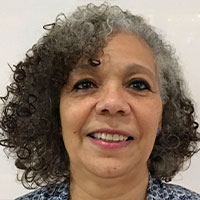 Brígida Coromoto Molina Carabaño
Profesora del área de Matemáticas Aplicadas
Professor of Applied Mathematics
Licenciada y Magister en Matemáticas por la Universidad Central de Venezuela, y Doctora en Ciencias con mención en Computación por la misma universidad. Dispone de una amplia experiencia tanto docente, con más de 30 años de docencia en asignaturas del área de Matemáticas en universidades de Venezuela y Perú, como investigadora, con más de 25 años en los que ha participado en más de 30 congresos y ha publicado 20 artículos en revistas tanto nacionales como internacionales en las áreas de Matemáticas y Computación. Ha participado en numerosos proyectos de investigación nacionales e internacionales, financiados por organizaciones como el CONCIT de Venezuela, o la Unión Europea, y ha colaborado en la organización de eventos como el II International Congres son Numerical and Computational Simulations o el VII PanAmerican Workshop in Applied and Computational Mathematics. También ha llevado a cabo labores académico-administrativas y de dirección en la Universidad Central de Venezuela, como el cargo de directora de la Escuela de Computación en dicha universidad.
Brígida Coromoto Molina Carabaño
Profesora del área de Matemáticas Aplicadas
Professor of Applied Mathematics
Licenciada y Magister en Matemáticas por la Universidad Central de Venezuela, y Doctora en Ciencias con mención en Computación por la misma universidad. Dispone de una amplia experiencia tanto docente, con más de 30 años de docencia en asignaturas del área de Matemáticas en universidades de Venezuela y Perú, como investigadora, con más de 25 años en los que ha participado en más de 30 congresos y ha publicado 20 artículos en revistas tanto nacionales como internacionales en las áreas de Matemáticas y Computación. Ha participado en numerosos proyectos de investigación nacionales e internacionales, financiados por organizaciones como el CONCIT de Venezuela, o la Unión Europea, y ha colaborado en la organización de eventos como el II International Congres son Numerical and Computational Simulations o el VII PanAmerican Workshop in Applied and Computational Mathematics. También ha llevado a cabo labores académico-administrativas y de dirección en la Universidad Central de Venezuela, como el cargo de directora de la Escuela de Computación en dicha universidad.
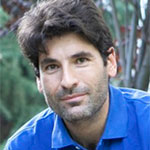 Juan Rubio Gómez
Profesor del área de Expresión Gráfica
Professor of Graphic Expression
Licenciado en Ingeniería Industrial por la Universidad Nebrija. Máster en Tecnologías de Edificación Sostenible y Energías renovables por la Universidad Nebrija. Master's Degree in Numerical Simulation in Engineering with ANSYS, por la UPM. Part Qualified European Patent Attorney (EPA) por la Oficina de Patentes Europea (EPO). Especialista en propiedad intelectual, en la tramitación de solicitudes de patentes, así como en asesorar y ofrecer consultoría a clientes sobre la estrategia de IP. En la Universidad Nebrija, dentro de la Escuela Politécnica Superior, tutor académico de prácticas profesionales, y coordinador y profesor del área de Expresión gráfica. Investigación las áreas del cálculo de estructuras mediante FEM, en el desarrollo, e implantación de un nuevo sistema de climatización y en la implantación de instalaciones renovables en la edificación.
Juan Rubio Gómez
Profesor del área de Expresión Gráfica
Professor of Graphic Expression
Licenciado en Ingeniería Industrial por la Universidad Nebrija. Máster en Tecnologías de Edificación Sostenible y Energías renovables por la Universidad Nebrija. Master's Degree in Numerical Simulation in Engineering with ANSYS, por la UPM. Part Qualified European Patent Attorney (EPA) por la Oficina de Patentes Europea (EPO). Especialista en propiedad intelectual, en la tramitación de solicitudes de patentes, así como en asesorar y ofrecer consultoría a clientes sobre la estrategia de IP. En la Universidad Nebrija, dentro de la Escuela Politécnica Superior, tutor académico de prácticas profesionales, y coordinador y profesor del área de Expresión gráfica. Investigación las áreas del cálculo de estructuras mediante FEM, en el desarrollo, e implantación de un nuevo sistema de climatización y en la implantación de instalaciones renovables en la edificación.
 Emilio Trigueros Páez
Profesor del área de Fundamentos de la Física
Professor of the area of Fundamentals of Physics
Doctor en Astrofísica por la Universidad de Alicante, Licenciado en Física por la Universidad de La Laguna y Master en Astrofísica por la Universidad Complutense de Madrid y. Ha publicado en diferentes revistas indexadas del primer cuartil, y participado en conferencias internacionales en el área de Astrofísica Estelar. Docente en la Universidad Antonio de Nebrija.
Emilio Trigueros Páez
Profesor del área de Fundamentos de la Física
Professor of the area of Fundamentals of Physics
Doctor en Astrofísica por la Universidad de Alicante, Licenciado en Física por la Universidad de La Laguna y Master en Astrofísica por la Universidad Complutense de Madrid y. Ha publicado en diferentes revistas indexadas del primer cuartil, y participado en conferencias internacionales en el área de Astrofísica Estelar. Docente en la Universidad Antonio de Nebrija.
 Gloria Zarzuelo Puch
Profesora del área de Energía
Gloria Zarzuelo Puch
Profesora del área de Energía Coordinadora de calidad de la Escuela Politécnica Superior Professor of Energy
Quality Coordinator of the Higher Polytechnic School Ingeniera Industrial por la UPM, especialidad Mecánica - Construcción. Máster en Prevención de Riesgos Laborales, especialidad Seguridad Industrial. Profesora de la Escuela Politécnica Superior desde el curso 2007/2008. Mención de excelencia docente en el curso 2017/2018. Estudios de doctorado en la UCLM. La investigación se centra en el análisis termodinámico y termoeconómico de la recuperación de energía residual en diferentes máquinas térmicas, fruto de la cual ha publicado el artículo científico “Thermodynamic and exergoeconomic analysis of energy recovery system of biogas from a wastewater treatment plant and use in a Stirling engine”, en la revista Renewable Energy.
More Academic Information
Official Degree: Bachelor's Degree in Logistics Engineering and Industrial Organization
- ecent Baccalaureate graduates.
- Students interested in pursuing a double degree with Industrial Technologies Engineering.
- Individuals seeking to enhance and complement their education.
- Professionals aiming to attain advanced technical training.
240 credits.
Minimum of 12 ECTS credits and maximum of 90 ECTS credits per enrollment and academic period.
Center responsible:Higher Polytechnic School
Branch of knowledge:: Engineering and architecture
Openings available: 45
Type of Teaching: Classroom attendance
Academic year in which it was implemented: 2024 - 2025
Languages: Spanish
University Services: [+info]
Competences Acquired from the Studies
- Ability to define and solve real-world problems requiring the application of knowledge in mathematics, physics, chemistry, or graphic expression, utilizing numerical algorithms and computational techniques when necessary.
- Proficiency in utilizing algorithms and models based on modern programming languages to automate data collection and analysis, thereby enhancing efficiency, effectiveness, and professional quality in logistics and industrial organization.
- Leadership in group projects, integrating collective knowledge to deliver cohesive solutions that incorporate contributions from all team members.
- Application and collaborative use of interdisciplinary knowledge within work teams, adapting to various logistics operations and industrial organizational settings.
- Integrate sustainability principles across all dimensions, with a specific focus on evaluating environmental challenges within logistics, transportation, and supply chain operations.
- Act ethically and responsibly in professional settings, demonstrating teamwork and leadership.
- Apply acquired knowledge and skills in practical settings, actively participating in Logistics Engineering and Industrial Organization teams.
- Utilize degree-acquired knowledge to develop, present, and defend projects within Logistics Engineering and Industrial Organization, synthesizing acquired competences effectively.
Admission Routes and Requirements
UNNE will publish on its website the places available for the first year of the Bachelor's Degree in Logistics Engineering and Industrial Organization. Below are the access routes to this Bachelor's Degree.
- 1. Students who have obtained a baccalaureate degree and passed the University Admission Tests are eligible to apply for admission.
- 2. Additionally, as stipulated in "Royal Decree 412/2014, of June 6, which establishes the basic regulations for admission procedures to official Bachelor's degree studies," the following students may also request admission to the University:
- a) Graduates of the European Baccalaureate or International Baccalaureate.
- b) Holders of Baccalaureate degrees, diplomas, or studies from educational systems of Member States of the European Union or other States with which international agreements are applicable.
- c) Holders of degrees, diplomas, or studies recognized as equivalent to the Baccalaureate degree under the Spanish Educational System, obtained or carried out in educational systems of non-EU States without international recognition agreements for the Bachelor's degree on a reciprocal basis, as per Article 4 of RD 412/2014.
- d) Students holding official diplomas of Higher Technician in Vocational Training, Higher Technician in Plastic Arts and Design, or Higher Sports Technician within the Spanish Educational System, or equivalent degrees approved under Spanish regulations, in accordance with Royal Decree 412/2014.
- e) Students holding degrees, diplomas, or studies other than those equivalent to Baccalaureate degrees, Higher Technician in Vocational Training, Higher Technician in Plastic Arts and Design, or Higher Sports Technician within the Spanish Educational System, obtained in a Member State of the European Union or in other States with which reciprocal international agreements are in place, provided they meet the academic requirements for university access in that Member State.
- f) Individuals who have successfully passed the university entrance test for applicants over 25 years of age.
- g) Individuals who have passed the access test to official Bachelor's degree studies for people over 40 years of age, based on accreditation of work or professional experience. Admission procedures for this route are detailed in "POA_9 Access Procedure for People Over 40 Years of Age."
- h) Individuals who have successfully passed the university entrance test for applicants over 45 years of age.
- i) Students holding an official Bachelor's, Master's, or equivalent degree.
- j) Students holding an official university degree of Associate's Degree, Technical Architect, Technical Engineer, Undergraduate, Architect, Engineer, corresponding to the previous organization of university education or an equivalent degree.
- k) Students who have completed partial foreign or Spanish university studies, or who have completed foreign university studies without obtaining homologation in Spain, and wish to continue their studies at a Spanish university. In this case, it is essential that UNNE has recognized at least 30 ECTS credits.
- l) Students who accessed university under regulations of the Spanish Educational System prior to the "Organic Law 8/2013, of December 9, for the improvement of educational quality."
- m) According to "Order ECD/1941/2016, of December 22, which determines the characteristics, design and content of the Baccalaureate evaluation for access to the University, the maximum dates for completion and resolution of the review procedures of the grades obtained, for the 2016/2017 academic year," its sole transitional provision states that passing the Baccalaureate evaluation test for university access is not necessary in the following cases:
- Students enrolled in a Baccalaureate course under the educational system defined by "Organic Law 8/2013, of December 9," who have subjects from the previous curriculum that were not passed before its implementation. They will take these subjects according to the curriculum of the previous educational system.
- Students who obtained their Baccalaureate degree in the 2015-2016 academic year but did not enroll in university at the end of that academic year.
In both cases, if these students do not take the entrance test, their grade for admission to official university degree studies will be the final grade obtained in their Baccalaureate studies.
For students with special educational needs arising from disabilities, evaluations will be conducted to determine necessary curricular adaptations, alternative study paths, or itineraries.
At UNNE, admission procedures adhere strictly to university legislation, emphasizing the core principles of access to Spanish universities: equality, merit, ability, universal accessibility, and alignment with the criteria of the European Higher Education Area. To apply for admission to any official Bachelor's degree program at the University, prospective students must complete the corresponding application via the University website or request it at any of the university campuses within the deadlines set by the Academic Development Department. Applications will only be processed for students who have submitted the required documentation within the specified deadlines outlined by the Admissions Department. Additionally, students may be requested to provide further information deemed necessary to assess their suitability for the Bachelor's degree program.
For pre-admission and admission evaluations, candidates will be assessed on a scale of 0 to 10 points, based on the following criteria and their respective percentages:
- Academic record from the student's educational background: 60%.
- Structured personal interview: 20%. The interview aims to assess the candidate's motivation, work ethic (consistency), training, knowledge, skills, aptitudes, attitudes, critical thinking, scientific curiosity, creativity, communication abilities, teamwork capability, extracurricular activities (such as music, sports, languages), and future aspirations relevant to pursuing a Bachelor's degree in Logistics Engineering and Industrial Organization at UNNE. The evaluation will also consider the candidate's experience, technical and professional skills necessary for their chosen field of study, motivation, attitudes, and other personal qualities contributing to their adjustment to the program. This interview will be conducted orally in Spanish.
- Multiple-choice Psychotechnical Test: 10%. This test assesses personality traits, exploring emotional, intellectual, social norms, and values relevant to each prospective student applying for the UNNE Bachelor's Degree in Logistics Engineering and Industrial Organization.
- Candidate Presentation Document: 5%. Candidates will prepare a personal document outlining their motivation and interest in the desired studies, along with any other relevant personal circumstances for the selection process.
- English Proficiency Test: 5%. Reflecting the competences outlined in the Bachelor's Degree in Logistics Engineering and Industrial Organization, an English proficiency test is included to evaluate adequate knowledge of the English language, both oral and written. The test comprises a comprehension exam with multiple-choice questions, conducted face-to-face or online in computer labs at each campus, supervised by teachers from the Institute of Modern Languages. Candidates may be exempt from this test if they provide a document certifying their English proficiency through official certifications recognized by the "Association of Language Centers in Higher Education" or the CEFR, valid for one year.
Admission tests are evaluated within a comprehensive strategy aimed at assessing applicant characteristics to determine if they possess the motivation, training, knowledge, skills, aptitudes, communication abilities, extracurricular activities, and future interests required for admission to the UNNE Bachelor’s Degree in Logistics Engineering and Industrial Organization curriculum.
The Admissions Committee will consist of the Vice-Rector for Academic Organization and Teaching Staff, the Director of University Development, the Dean of the School, and the Registrar of the University. Any of them may delegate their responsibilities to a designated representative within their respective departments.
In cases where the number of applicants exceeds available spots, unsuccessful candidates will be placed on a waiting list for potential vacancies that may arise before the start of the program. Selection for these vacancies will follow the previously outlined admission criteria. The Admissions Department will convene to select candidates based on the evaluation scale and will notify the results to candidates via email, telephone, and letter, prompting them to proceed with enrollment. The enrollment process will include the following phases:
- Place Reservation: Candidates are required to reserve their place by making a financial commitment. This reservation secures the candidate's spot at UNNE. The place reservation fee is non-refundable except in cases where the student is not definitively admitted, fails to meet the legal access requirements, or is unable to enroll at UNNE due to justified medical reasons.
- Enrollment: Pre-enrolled candidates seeking to finalize their academic enrollment at UNNE must complete the following steps within the specified deadlines:
- Submission of Documentation: Applicants must provide proof that they meet the requirements stipulated by Spanish university legislation to commence university studies.
- Formalization of Enrollment Process Online: The self-enrollment service available on the UNNE website enables admitted students to complete all academic, financial, and administrative procedures within specified deadlines. Upon receiving their admission letter, students will also receive an access code and personal password necessary for self-enrollment. Once self-enrollment is completed, the candidate obtains official student status at UNNE.
Students with non-university foreign studies pending homologation may be conditionally admitted to UNNE pending compliance with current regulatory requirements. Upon resolution of the homologation process, students must submit documentation proving completion. Failure to do so will result in voided admission, enrollment, and any exams taken, if applicable.
For Bachelor's Degree studies, students may enroll in a minimum of 45 ECTS credits and a maximum of 70 ECTS credits per academic year for full-time study, and a minimum of 12 ECTS credits and a maximum of 45 ECTS credits for part-time study. These limits apply to all modalities offered at UNNE (in-person, blended or hybrid, and distance learning). The Academic Department Director may authorize enrollment in a different number of credits for exceptional reasons.
Enrollment modification refers to any change made to a student's enrollment. If a student wishes to change their enrolled Degree, subjects, electives, or program, they must submit a written request to the Registrars for approval by the relevant Academic Department. Requests must be submitted within 15 days of the academic year's effective start or the beginning of the second semester. After this period, no further changes to enrollment will be permitted.
Employabilty
Career Opportunities
Upon completion of the Bachelor's Degree in Logistics Engineering and Industrial Organization, graduates will be able to develop their professional careers in:
Collaboration Agreements for Professional Internships
This Bachelor's program maintains collaboration agreements for professional internships with some of the top companies and institutions in the sector, among which are:
Employability recognized in the Rankings
The commitment of Nebrija University to the academic requirement, training in leading companies and institutions, innovation in multidisciplinary programs and international projection, places the University in the top positions of the most important rankings.
The International Ranking QS Stars awards Nebrija University the maximum score in the quality and satisfaction of students in teaching, employability of the graduates and the internationalization of the institution.
The national rankings also recognize Nebrija University as the first Spanish university in teaching and second in employability, highlighting its performance in research, knowledge transfer and internationalization.
The Bologna Declaration formalized the principles on which the European Higher Education Area should be based: quality, mobility, diversity, competitiveness and employment growth.
From this, Nebrija stands as an academic model of reference, educating students with excellent individual behavior, interaction with their environment and motivated by and for constant and continuous training. The Nebrija Institute of Professional Skills works every day to achieve the differentiation of our students through the development of attitudes and skills.
The main objective is for students to achieve the best of themselves through the development and empowerment of their personal skills and resources through personal self-knowledge.
In addition, some of the professional skills that are worked on within the three seminars are those related to interpersonal skills and active communication skills and negotiation, indispensable for our students to know how to transmit ideas, to argue them, to provide information and opinions in an adequate, clear and convincing way.
Within what will be their work performance, other aspects such as teamwork, conflict resolution and project management ability will be worked on.
In the third block, skills worked on are those aimed at increasing the student's employability. They will work with tools and techniques for job searching, and perform tasks that achieve in the student a greater use of their personal skills.
For all this we have currently active experts in selection of people, professionals dedicated to personal and professional training and professionals dedicated to the world of communication and the arts.
In this way, and in a complementary way to his/her specific training, we help the student create a differentiating pattern in the social and business environment in which he/she will be immersed when he/she finishes his/her studies.
International
The Department of International Programs at Nebrija University consistently monitors agreements with renowned universities worldwide.
Your Bachelor’s Degree in Logistics Engineering and Industrial Organization
Visit all the Activities of the Higher Polytechnic School
Launch of the autonomous vehicle
FEM Expert and Nebrija University are combining cutting-edge engineering with other fields such as computer science, ethics, psychology and legal issues related to the essential homologation of the vehicle in this transversal project.
Mathematics and Physics in the digital age
Session that addressed the challenges and opportunities of mathematicians and physicists in the digital age, interdisciplinarity, innovation and technology, as well as the bachelor's degrees in Applied Mathematics and Applied Physics (and its double degree) launched by the Nebrija University's Higher Polytechnic School.
Investiture ceremony of Carlos López-Otín as doctor honoris causa
Nebrija University named biochemist Carlos López-Otín a doctor honoris causa last Friday, November 18, in a ceremony that took place in the Conference Hall of the Madrid-Princesa Campus, and had Cristina Garmendia, president of the Cotec Foundation, PhD in Biological Sciences and former Minister of Science and Innovation, as the sponsor.
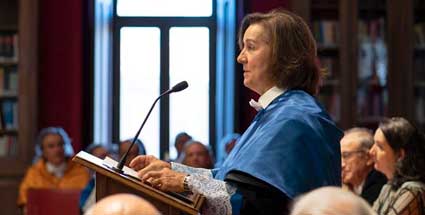
Pilar Vélez proclaims her passion for mathematics at the official opening of the 2022-2023 academic year
Devotion colored the atmosphere of the opening ceremony of the 2022-2023 academic year at the Madrid-Princesa Campus of Nebrija University. It was present in the gestures and in the words of the speeches of academic personalities and in the title of the inaugural lesson – Devotion to Mathematics. From great discoveries to the discovery of theorems – proclaimed by Pilar Vélez Melón, professor of Mathematics and director of the Mathematics and its Applications research group.
See newsWelcome Sessions for the 2022-2023 academic year
Nebrija University held Welcome Sessions aimed at new face-to-face bachelor's degree students for the 2022-2023 academic year.
The sessions took place on September 7, 8 and 9 and in them the students got to know the University, professors, departments, facilities and colleagues who will be part of their university life.
Bachelor's Degrees in Nebrija University's Engineering Area
Discover the Bachelor's Degrees of Nebrija University's Higher Polytechnic School

